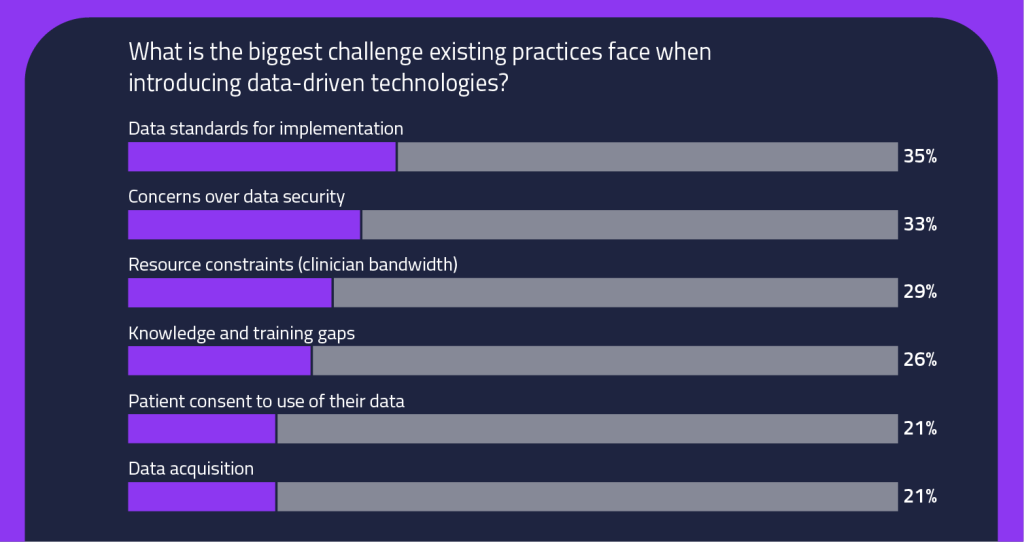3rd February 2022
Data and health leaders shared their expert knowledge at a recent EIT Health Ireland-UK event. Here is a roundup of the highlights.
Last week we hosted the first webinar in EIT Health Ireland-UK’s ‘Transforming Healthcare’ series. Expert panellists joined from across the health and data industry, sharing insights on what opportunities are on the horizon for health practitioners and patients alike through data-driven technologies. Each set out practical advice regarding ‘How to Deploy Data at Scale in Healthcare Environments.’
The event was moderated by EIT Health CEO Jan-Philipp Beck, and the panellist line-up included:
- Liam English, CEO and Founder at Bluemetrix
- Niall McDonagh, Healthcare Sector Director, Western Europe at Microsoft
- Miriam Roche, CIO / Director of Informatics (Acting), St James’s Hospital Dublin
- John Swords, National Director, Health Service Executive Procurement
- Donal Sexton, Consultant Nephrologist at Tallaght University Hospital and St. James’s Hospital, and Clinical Associate Professor at Trinity College Dublin
Across Europe, there is a gap in public understanding of health data and how it is used. For example, almost one in two [1] Belgian citizens does not understand what is meant by ‘health data’ and has never heard of an electronic health record (EHR). This, paired with the many barriers to data adoption health professionals face, can slow down progress in this area.
Barriers to data adoption
During the event we posed a simple question to an audience of 100+ healthcare professionals – ‘What is the biggest challenge existing practices face when introducing data-driven technologies?’
The poll results? Not so simple.

Niall from Microsoft provided his perspective:
“The two I would call out are bandwidth and knowledge deficit. Bandwidth deficits can exist both within IT departments in hospitals – as they have so many legacy systems to manage – and bandwidth issues on the clinical side. So, it’s a dual bandwidth issue.
We have a dual knowledge deficit issue too. Firstly, with compliance. What are the requirements and what do I need to do to comply? That combined with a knowledge deficit about the tools available to help you with your first step quite often cause inertia.”
Liam from Bluemetrix later gave practical advice to those taking that first step.
“You don’t need to engage an external organisation to start the process. The first step is simple. Understand your data. Look at your legacy systems. From there you can map it and find the data sets that are of value. Then decide where you go with your data project. This will help you design your project and get it focused from the very start.”
Overcoming the obstacles
Overall, these were the key takeaways from our panellists:
1. Stakeholder engagement
John explained that to motivate staff to address knowledge and bandwidth deficit, a change management process should be set out. To “get the mindset right” of all stakeholders involved “it must be about moving forward in a collective way. Get the message to people early about the benefits.”
Niall backed up this point, by stating “If you’re going to do anything useful with data, you need the clinicians involved early on in the process.” Clinician buy-in is critical as they are part of both the decision-making process and care delivery.
2. Communication and transparency
New thinking is required to overcome patient consent issues. Miriam, Donal, and Liam advocated for better communication and transparency. According to Donal, by clearly communicating the value of the data and being transparent about what you are doing with it, patients are quite often happy to consent because they can understand the intended outcome.
Miriam advised attendees, “Talk to patients about their data as well as their healthcare.”
3. Collaboration
Miriam talked about the ‘data scarcity’ many healthcare organisations encounter. With no national EHR in Ireland, open innovation can be limited. She encourages healthcare organisations to share learnings with one another through open source. Ultimately they are working towards a common goal, and data can present significant opportunities in reaching that goal via personalised medicine.
Find out more
Watch the full webinar on demand.
Read our Think Tank report – Learning from Health Data Use Cases.
To receive future event invites straight to your inbox, sign up to our newsletter.
King Boudouin Foundation. 2022. Belgians know relatively little about the data relating to their health. (online) Available at: https://www.kbs-frb.be/en/belgians-know-relatively-little-about-data-relating-their-health (Accessed 2 February 2022)
New article lays framework for DMD evaluation in EU

An EIT Health-led article published in Nature.
New data shows AI innovation needs skills beyond coding

The largest live dataset of AI start-up talent analysed.
Europe's top health start-ups take centre stage: EIT Health Catapult winners are revealed at HLTH Europe

2025 Catapult programme winners announced.